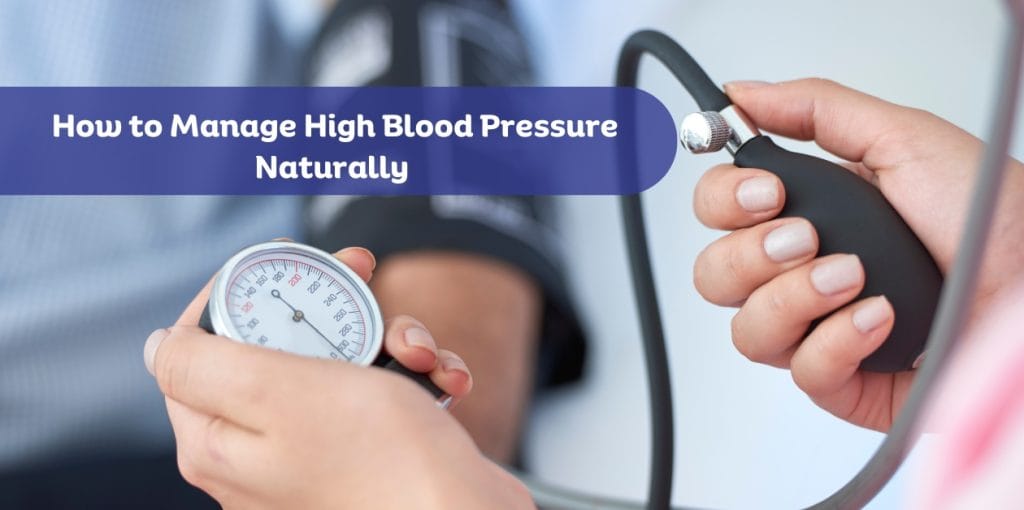How to Manage High Blood Pressure Naturally

High blood pressure, also known as hypertension, is a common yet serious condition that affects millions of people worldwide. It can lead to severe complications, including heart disease, stroke, and kidney damage, making blood pressure management a crucial aspect of maintaining overall health. While medication plays a key role in treating high blood pressure, there are natural ways to manage and even reduce hypertension effectively.
What Is High Blood Pressure?
High blood pressure is a condition in which the force of the blood against the walls of the arteries is consistently too high. If left untreated, it can damage blood vessels and organs, increasing the risk of serious health issues such as heart attacks, stroke, and kidney disease.
Blood pressure is measured in millimetres of mercury (mmHg), with two readings:
- Systolic pressure (the top number) measures the force of blood against the artery walls when the heart beats.
- Diastolic pressure (the bottom number) measures the force when the heart rests between beats.
A normal blood pressure reading is typically around 120/80 mmHg. High blood pressure is defined as readings consistently higher than 130/80 mmHg.
Natural Ways to Manage High Blood Pressure
While medications are often prescribed for hypertension management, several lifestyle changes can help lower blood pressure naturally. These include:
1. Adopt a Healthy Diet (DASH Diet)
The DASH (Dietary Approaches to Stop Hypertension) diet is designed specifically to reduce high blood pressure. It emphasizes:
- High consumption of fruits, vegetables, whole grains, and low-fat dairy.
- Reducing salt intake to less than 1,500 mg per day.
- Eating lean proteins such as fish, poultry, and legumes.
The DASH diet is rich in potassium, magnesium, and fiber, all of which contribute to healthy blood pressure levels. Reducing processed foods and cutting back on sugary snacks can also have a positive impact on heart health.
2. Exercise Regularly
Physical activity is one of the most effective ways to lower blood pressure naturally. Regular exercise helps strengthen the heart, enabling it to pump blood more efficiently, which reduces the pressure on your arteries.
- Aim for at least 150 minutes of moderate-intensity aerobic exercise, such as brisk walking or cycling, every week.
- Strength training exercises twice a week can also improve heart health and reduce high blood pressure.
Staying active also helps with weight management, which is another key factor in controlling hypertension.
3. Reduce Stress Levels
Chronic stress can contribute to high blood pressure by triggering the release of stress hormones like cortisol. These hormones can cause blood vessels to constrict, increasing the heart’s workload. Managing stress effectively is therefore an essential part of blood pressure management.
- Try relaxation techniques such as deep breathing, meditation, yoga, or mindfulness.
- Taking breaks during the day and getting adequate sleep can also help reduce overall stress.
4. Limit Alcohol and Caffeine intake
Excessive alcohol consumption and high caffeine intake can both lead to elevated blood pressure. Moderating your intake of these substances can help lower blood pressure over time.
- Limit alcohol to no more than one drink per day for women and two drinks per day for men.
- While moderate caffeine consumption may not significantly affect blood pressure in most people, excessive caffeine should be avoided, especially in those who are sensitive to it.
5. Maintain a Healthy Weight
Being overweight or obese puts extra strain on the heart and blood vessels, making it harder to maintain healthy blood pressure. Even a small reduction in weight—around 5 to 10%—can have a noticeable effect on blood pressure control.
- Incorporating regular exercise and a balanced diet into your lifestyle is key to achieving and maintaining a healthy weight.
- Focus on sustainable lifestyle changes rather than crash diets for long-term results.
6. Increase Potassium Intake
Potassium is a mineral that helps balance the effects of sodium in the body. Increasing potassium-rich foods in your diet, such as bananas, spinach, sweet potatoes, and tomatoes, can help lower blood pressure.
7. Get Enough Sleep
Poor sleep, especially conditions like sleep apnea, can contribute to high blood pressure. Ensuring that you get adequate, quality sleep is essential for maintaining healthy blood pressure levels.
- Aim for 7-9 hours of sleep per night.
Maintain a regular sleep schedule and create a calm, dark sleeping environment.
Conclusion
Managing high blood pressure naturally is essential for maintaining heart health and preventing long-term complications. By adopting healthy lifestyle habits such as eating a balanced diet, exercising regularly, managing stress, and maintaining a healthy weight, you can effectively control your blood pressure.
FAQs
Adopting a healthy diet (such as the DASH diet), exercising regularly, reducing stress, maintaining a healthy weight, limiting alcohol and caffeine, and improving sleep quality can all help lower blood pressure naturally.
Yes, chronic stress can lead to elevated blood pressure by triggering the release of stress hormones, which can constrict blood vessels and increase the heart’s workload.
Aim for at least 150 minutes of moderate aerobic exercise per week, along with strength training twice a week, to help lower blood pressure.
Yes, diets like the DASH diet, which include a variety of fruits, vegetables, whole grains, and low-fat dairy, can significantly help lower blood pressure by reducing sodium intake and providing key nutrients like potassium and magnesium.
It’s essential to work with your healthcare provider when managing hypertension during cancer treatment. Dr. Venugopal Arroju and his team at PI Health Cancer Hospital offer personalized care that integrates blood pressure management with cancer therapies.
Potassium helps balance the effects of sodium in the body, which can help lower blood pressure. Foods rich in potassium include bananas, spinach, sweet potatoes, and tomatoes.
About Author
Dr. Y Swetha
MBBS ,MD General Medicine
Dr. Y Swetha is a skilled physician currently practicing at PI Health Cancer Hospital. She holds an MBBS from Kamineni Institute of Medical Sciences and an MD in General Medicine from Prathima Institute of Medical Sciences.Dr. Swetha has extensive experience in outpatient, inpatient, emergency, and critical care settings. She is proficient in managing chronic conditions, critical emergencies, and advanced procedures such as ventilator management and catheter placements.Her academic contributions include presentations on deep vein thrombosis, splenic infarcts, and cardiac tamponade. Dr. Swetha also volunteered as a Telemedicine Doctor during the COVID-19 pandemic, demonstrating her commitment to patient care.With a First Class in MD and fluent in English, Telugu, and Hindi, Dr. Swetha is dedicated to providing compassionate and comprehensive medical care.

